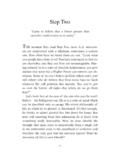Transcription of Take the Call: Nehemiah “Prayer”
1 -1- take the call : Nehemiah prayer (Don t Miss Yours) January 17/18, 2015 Digging Deeper take the call : Nehemiah , prayer Written by: Robert Ismon Brown Background Notes Key Scripture Text(s): Ezra 9:6-15; Nehemiah 1:5-11; 9:6-37. Introduction Michael Duggan has written The three penitential prayers in Ezra- Nehemiah (Ezra 9:6-15; Nehemiah 1:5-11; 9:6-37) function as keys for interpreting the whole narrative from a theological perspective. 1 As we consider the theme every heart has a call in the writings of Ezra- Nehemiah , Duggan s remark reveals the close connection between the idea of the call and the essential role of prayer , particularly as confession. The word penitential essentially means showing penitence or sorrow for sin with a view to confession and forgiveness. The Hebrew Psalter is full of such prayers, and these no doubt shape the form and style of what we find in our present texts.
2 Strong parallels exist between the three prayers aforementioned, allowing us ample opportunity to discover the use of such prayers in the life of the faith community, then and now. In our study this week, we will concentrate on the structure and themes of these three prayers, paying attention to their context in the storyline and how they might have functioned in the life of the Jewish community of returned exiles. We have already noted from last week s extended study that the call of Nehemiah did not come from audible voices or angelic appearances as had been the case for the prophets before the exile. Nehemiah does not say, for example, When I heard about the woes of my people back in the land, I saw the Lord, high and lifted up, as might have been the case with the prophet in Isaiah 6. Instead, the report from the homeland led to the prayer we find in Nehemiah 1, and through that prayer to the man s sense of call to proceed with his request from King Artaxerxes.
3 One might say that the Word of God came to Nehemiah through the spirit of his prayer and the impact of such praying on his heart. The pattern seems to be the same for the prayer of Ezra and the prayer of the people within the same collection: Ezra 9:5-15 and Nehemiah 9:6-37. In addition, the form and style of these prayers also appears in another setting, namely, that of the book of Daniel in his prayer found in 9:3-23. What emerges from our study of prayer in these texts is that the Lord God and His purposes through His history with Israel become the focus of the petitions, confessions, and confidence of forgiveness. Central to prayer is the covenant, that serious relationship God formed with His people long before, and that still sustains them in their difficulties back in the land after the exile. Through prayer , Israel not only turns to God, but also returns to God through confession and penitence.
4 Nehemiah only contemplates God s call for him to act after he has dealt seriously with his sins and those of his people. That is why in our investigations of the word repentance throughout Scripture, the emphasis continues to fall on the idea of turn and return, actions most appropriate for a people who are returning from exile. But the prayers exhibited in Ezra- Nehemiah show that even after God s people are back in their land, they are still in exile until they deal with confession and repentance. Nehemiah only imagines his calling after his heart is cleansed through the grace of prayer . Covenant obedience begins with the heart returning to God. 1 Ezra 9:6-15: A Penitential prayer within Its Literary Setting. Seeking the Favor of God: The origins of penitential prayer in Second Temple Judaism.
5 Edited by Boda, Falk, and Werline (Atlanta: Society of Biblical Literature, 2006), 165. -2- Approaching prayer in Ezra- Nehemiah : The prayer of Nehemiah ( Nehemiah 1) Although we examined last week the prayer found in Nehemiah 1:4-11, the following analysis opens up more specific elements of prayer found elsewhere in the Ezra- Nehemiah collection. Using these elements we will then gain additional insight from the other two prayers. 1. Existing conditions prompt the prayer . According to 1:4a it was the hearing of these words from Nehemiah s brother about the plight of Jerusalem that led him to pray. After returning to the land and rebuilding the temple, a series of setbacks led to a disintegration of the public works projects necessary to restore community life in Jerusalem. 2. Bodily responses preceded the prayer . Notice the words indicating Nehemiah s posture and bodily attitude: sat down, wept, and mourned.
6 These are the symptoms of grief from loss, and before the man utters a single word, he allows the process of deeply physical reaction to do its important work in his body. prayer is not disembodied meditation that unplugs human beings from their concrete selves, but arises from the real conditions not only in the world, but also in their whole being (1:4b). 3. The name of God takes on a special tone. If we scan quickly through this chapter, the supplicant ( the person who prays) uses different forms to address God, such as, God of heaven (1:4), Yahweh God of heaven (1:5a), great and awesome God (1:5b), Lord (Hebrew=Adonai, master, sovereign ) (1:11). Refers to Jerusalem as the place at which I have chosen to establish my name (1:9), indicating the importance of giving concrete expression to God s name.
7 This name is to be revered by God s servants (1:11). 4. Who God Is and What He has done are prominent. God s profile and His actions, revealed by strong verbs in the text, are notable and worth listing: a. Great and awesome (1:5) b. Who keeps covenant (1:5) c. Steadfast love (1:5) d. Commanded Moses (1:8) e. Will gather His outcast people (1:9) f. Will bring His people to His chosen place (1:9) g. Redeemed His servants and people (1:10) h. Great power and strong hand (1:10) i. Able to hear the prayer of His servants (1:11) j. Able to give success to Nehemiah (1:11) k. Able to grant mercy to Nehemiah (1:11). 5. Covenant issues for God s people Israel. God s profile (above) includes covenant-keeping and steadfast love (Hebrew: h esed) toward Israel, but this requires reciprocal actions from His people, namely, to love God and keep His commandments (1:5).
8 The object of this prayer is dealing with Israel s failing to keep covenant which led to God scattering Israel among the nations (1:7-8). Nehemiah reaches into the ancient texts, paraphrasing Deuteronomy 30:1-5, to reinforce the basis for his request for forgiveness. Scripture prepares the heart for prayer by keeping us grounded in our creed, in what we believe. When we say that prayer is covenantal, we mean that the roots for praying run deep in the promises and precepts of God s Word to which we bear deep responsibility. Knowing that we have not kept faith drives us to pray as Nehemiah does here. Put simply, Israel broke covenant and went into exile. If Israel keeps covenant again, then God is faithful to fully restore them to the land and help them rebuild their city, Jerusalem. Repeatedly, Nehemiah calls himself servant and his people servants, also identifying Moses as your servant (1:6, 8, 10, 11).
9 The servant is one who commits to the covenant made with Yahweh, the God of Israel. The phrases your servants and your people parallel each other in 1:10, and prayer affirms both roles for the supplicant before the covenant Lord. One speaks of responsibility and submission, the other of ownership and a sense of belonging. -3- prayer is an exercise in covenant renewal after a great loss and after a wide breach in relationship. It does not presume to cross the breach or restore the loss through its own energy, but appeals to the single most important role of God when it says to Him: You redeemed by your great power and strong hand (1:10). prayer relies on redemption as the saving work of the covenant God who keeps His Word with steadfast love. To redeem means release from slavery, captivity, or other forms of bondage, and finds its clearest expression of Jewish history in the Exodus as enshrined in the feast of Passover.
10 prayer knows that sacrifice lies at the heat of redemption, and that the sins of Israel, both personal and national, require the sacrifice of redemption to bring salvation deliverance. Whatever difficulty Israel faces at the present time depends on the redemptive prayer of Nehemiah for resolution. 6. Confession of sin shapes the penitential nature of prayer . Nehemiah is not na ve nor judgmental in dealing with Israel s sins, for he identifies both we and I when addressing the sin problem. Knowing his own weakness and failure, and perhaps facing his own anxiety about remaining in Persia while his brother and sisters returned to their land, Nehemiah summarizes his prayer of confession by saying, We have offended you deeply, failing to keep the commandments, the statutes, and the ordinances that you commanded your servant Moses (1:7).






